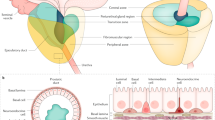Abstract
Neoplastic diseases of the prostate, both benign and malignant, are the result of or are associated with a sequence of genetic changes. While the sequence of these molecular events is under study, recent evidence suggests that both benign prostatic hyperplasias and malignancies of the prostate may be part of similar pathways. Currently, it is unclear if benign lesions are precursors of malignant change. The malignant spectrum also represents a continuum of disease, ranging from a clinically silent or latent form to palpable local lesions and ultimately to metastases. It is postulated that additional genetic alterations are associated with or required for further progression. In most patients these changes evolve over many years. As a result, there are many competing causes of death in addition to the tumour, particularly in elderly patients with localised lesions, and many patients die “with” as opposed to “from” the disease. Thus, a key to selecting the appropriate treatment for an individual patient, is to refine our ability to define the biological and clinical potential of a tumour.
Access this chapter
Tax calculation will be finalised at checkout
Purchases are for personal use only
Preview
Unable to display preview. Download preview PDF.
Similar content being viewed by others
References
Gleave ME, Hsieh JT, von Eschenbach AC and Chung LW K: Prostate and bone fibroblasts induce human prostate cancer growth in vivo: implications for bidirectional tumor-stromal cell interaction in prostate carcinoma growth and metastasis. J Urol 1992(147):1151–1159
Goldenberg SL, Bruchovsky N, Rennie PS and Coppin CM: The combination of cyproterone acetate and low dose diethylstilbestrol in the treatment of advanced prostatic carcinoma. J Urol 1988 (138):1460–1465
Scher HI and Cordon-Cardo C: Current and future therapeutic strategies in metastatic hormonal resistant prostate cancer: therapy based on phenotype. Problems in Urology 1992
Miller JI, Ahmann FR, Drach GW, Emerson SS and Bottaccini MR: Clinical usefulness of serum prostate specific antigen after hormonal therapy of metastatic prostate cancer. J Urol 1992 (147):956–961
Kelly WK, Scher HI, Mazumdar M and Vlamis V: Prostate specific antigen (PSA) as a measure of disease outcome in hormone refractory stage D2 prostate cancer. J Clin Oncol 1993 (11):607–615
Tannock I, Gospodarowicz M, Meakin W, Panzarella T, Stewart L and Rider W: Treatment of metastatic prostatic cancer with low-dose prednisone: evaluation of pain and quality of life as pragmatic indices of response. J Clin Oncol 1989 (7):590–597
Scher HI, Curley T, Geller N, Dershaw D, Chan E, Nisselbaum J, Alcock N, Hollander P and Yagoda A: Gallium nitrate in prostatic cancer: evaluation of antitumor activity and effects on bone turnover. Cancer Treat Rep 1987 (71):887–891
Maxon HR, Schroder LE, Thomas SR, Hertzberg VS, Deutsch EA, Scher HI, Samaratunga RC, Libson KF, Williams CC, Moulton JS and Schneider HJ: 186-Re(Sn)-HEDP for the treatment of painful osseous metastases: initial clinical experience in 20 patients with hormone resistant prostatic cancer. Radiology 1990 (176):155–159
Fishman B, Pasternak S, Wallenstein SL et al: The Memorial Pain Assessment Card: a valid instrument for the evaluation of cancer pain. Cancer 1987 (60):1151–1158
Kelly WK and Scher HI: Prostate specific antigen decline after antiandrogen withdrawal. J Urol 1993 (149):607–609
Yagoda A, Smith JA, Soloway MS, Tornera K, Seidmon EJ, Olsson C and Wajsman Z: Phase II study of estramustine phosphate in advanced hormone refractory prostatic cancer with increasing prostate specific antigen levels. J Urol 1991 (145):384A (Abstract)
Seidman AD, Scher HI, Petrylak D, Dershaw DD and Curley T: Estramustine and vinblastine: use of prostate specific antigen as a clinical trial end point for hormone refractory prostatic cancer. J Urol 1992 (147):931–934
Scher HI: Suramin: here to stay? JNCI 1993 (85):594–597
Myers, C, Cooper M, Stein C, LaRocca R, Walther MM, Weiss G, Choyke P, Dawson N, Steinberg S, Uhrich MM, Cassidy J, Kohler DR, Trepel J and Linehan WM: Suramin: a novel growth factor antagonist with activity in hormone-refractory metastatic prostate cancer. J Clin Oncol 1992 (10):8S1–889
Smith DC, Vogelzang NJ, Goldberg HL, Gockerman JP, Winer EP and Trump DL: High-dose cyclophosphamide (CTX) with granulocyte-macrophage-colony stimulating factor (GM-CSF) in hormone-refractory prostatic carcinoma. Proc Am Soc Clin Oncol 1992 (11):213
Logothetis CJ, Dexeus F, Chong CDK, Sella A and Finn L: Cytotoxic chemotherapy for hormone-refractory metastatic prostate cancer. In: Johnson DE, Logothetis CJ and von Eschenbach AC (eds) Systemic Therapy for Genitourinary Cancers. Year Book Medical Publishers, Chicago 1992 pp 234–238
Author information
Authors and Affiliations
Editor information
Editors and Affiliations
Rights and permissions
Copyright information
© 1994 Springer-Verlag Berlin Heidelberg
About this paper
Cite this paper
Scher, H.I. (1994). Hormone-Independent Prostate Cancer: Management of the Disease Continuum. In: Denis, L. (eds) Prostate Cancer 2000. ESO Monographs. Springer, Berlin, Heidelberg. https://doi.org/10.1007/978-3-642-79178-9_10
Download citation
DOI: https://doi.org/10.1007/978-3-642-79178-9_10
Publisher Name: Springer, Berlin, Heidelberg
Print ISBN: 978-3-642-79180-2
Online ISBN: 978-3-642-79178-9
eBook Packages: Springer Book Archive




